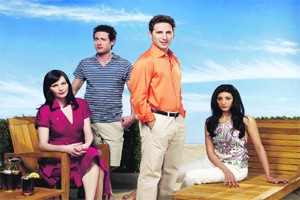Stay updated with the latest - Click here to follow us on Instagram
Long road home
Last year,Slumdog Millionaire made everything that is Indian exotic...

Last year,Slumdog Millionaire made everything that is Indian exotic. From being a country of palaces,snake charmers and spirituality,India became the nation that music maestro A R Rahman,the gorgeous South Asian Freida Pinto and,partly,Dev Patel belong to. With spotlight on India,the likes of Kal Penn,Jimmy Mistry and Naveen Andrews are now no more the only easily recognisable celebrities.
The list has grown quite long. Avatar and Inception has brought actor Dileep Rao into news. The television industry in particular is dotted with Indian origin actors. Recently,Archie Panjabi,a British actress of Indian origin,bagged an Emmy for her role in CBS show The Good Wife. Sendhil Ramamurthy shot to fame as a scientist in the supernatural thriller show Heroes,Deep Katdare is a popular actor who starred in the film American Desi,Samrat Chakrabarti was recently seen in films like Claire McCarthys The Waiting City and Reshma Shetty features in USA Networks hit original series Royal Pains. The roles being offered to an actor of Indian origin are no more limited to that of a taxi-driving
migrant or a terrorist.
Both Chakrabarti and Shetty agree that the scenario is changing for an actor of Indian origin in the entertainment industry in the West. Increasingly,diverse roles are being written to accommodate the ethnicity. However,the scenario isnt as pleasant as one might perceive it to be. Slumdog acted as a catalyst in heightening the Wests interest in India. The film industry be it Bollywood or Hollywood is very fad-oriented. Things happen,awards are won and then it quickly fades away. To get noticed in this industry is one thing,but to maintain excellence is much tougher, says Chakrabarti. Now there are directors and producers out there who are willing to think out of the box,but it has been frustrating to be considered for roles only because of my cultural identity, adds Shobita Mehta,a drama student at New York University.
This struggle to create an identity in the West often begins at home. Many first generation actors grow up preparing for a traditional career in medicine or engineering. They find their true calling much later. While Ramamurthy is a popular example,the same stands true for Shetty. I was set on becoming a doctor. But I had also been a musician since I was a child. But as an Indian child,the thought of making a career in entertainment was never really considered. It was not until I had won another state vocal competition that a teacher took me aside and suggested that maybe I had a gift I should pursue, she recounts.
Being a second-generation Indian in the US,18-year-old Mehta feels she has had it easier at home. My parents,who grew up in Massachusetts,moved to the Silicon Valley to pursue careers in IT. But they realised the value of personal choices. My younger brother will be joining a course in ballroom dancing next year and it is fine by them, she says,smiling.
Still,it is the first generation Indian abroad who struggles with an identity crisis often striving to strike a balance between the desi roots and the Western upbringing. Panjabi,who was born in India,grew up in the UK and now works in New York. She prefers to think of herself as a global citizen. I am first and foremost an actor, she quips. Shetty points out,We are expected to have the same beliefs as our parents though we have grown up in a completely different society. When you are younger,you tend to dislike your cultural boundaries. However,as I grow older,I do think it is important to balance your dual cultural identity and use it as a positive addition to your personality. She says that there is a community,though small,of first-generation Indian filmmakers and actors who make culture-themed movies.
More than anything else,says Aroon Shivadasani the president of Indo-American Arts Council,which helps develop new projects feels that it is the perception of India that should change in the West. Then,the changes in terms of characters to be played out by Indians will naturally follow. The issue we are often dealing here with are that the Indian-origin actors,in the beginning of their careers,are offered roles that are often derogatory to the cultural identity, he says.
Panjabi rightly nails down this issue to the lack of writers of ethnic origin. The cultural boundaries are fast melting away. The writing should reflect the times we live in. Agrees Chakrabarti. We have a long way to go before you can have more three-dimensional characters for South Asian actors.